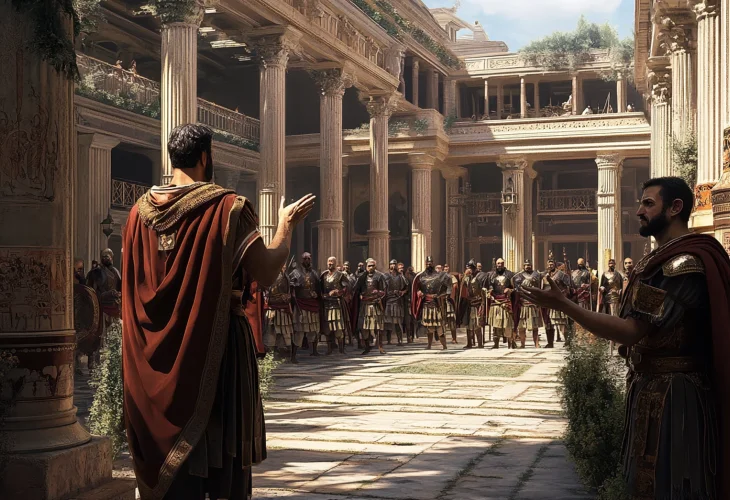History and Archaeology
A Jewish King Who Helped Shape the Roman Empire’s Future
How King Agrippa’s quick thinking changed history and brought peace to his people

Life was harsh and bitter for our ancestors under the heavy hand of the Romans toward the end of the Second Temple period. Decades earlier, a civil war had broken out among the Jews, and the Romans were invited to help make peace. Instead, they took control of Jerusalem. From that point on, the Jewish people endured the cruelty of King Herod, oppressive Roman governors, and the fulfillment of the Torah’s warning: “The foreigner who resides among you will rise higher and higher above you, and you will sink lower and lower… Your ox will be slaughtered before your eyes.”
For forty long years, Herod ruled with fear and bloodshed. Even his close friend, the Roman Emperor Augustus, famously said, “It is better to be Herod’s pig than his son,” referring to Herod’s refusal to eat pork but his willingness to kill his own sons if he thought they might take his crown. Among his victims was Aristobulus, a descendant of the Hasmonean dynasty (the family of the Maccabees). Aristobulus’ son, Agrippa, was just a child when his father was murdered. This boy would one day become Agrippa I, a righteous and God-devoted king, praised by our sages for his loyalty to Torah and mitzvot (commandments).
As was customary for royalty under Roman rule, Agrippa was sent to Rome to be educated. He was raised in the home of Princess Antonia, a powerful Roman noblewoman and mother of Germanicus, the celebrated general who conquered Germany, and Claudius, a bright but physically disabled young man who lacked the commanding presence the Romans admired.
Over the years, Agrippa trained and studied alongside the Roman brothers, learning military skills and philosophy. Yet through it all, he remained a faithful Jew, keeping the commandments, listening to the sages, and holding fast to his fear of Heaven.
In the year 41 CE, Agrippa traveled to Rome with an urgent mission: to plead with the unstable Emperor Caligula to protect the Jews of his vast empire, who were facing violent attacks. But before he could meet the emperor, shocking news shook the city, Caligula had been assassinated by conspirators in the royal passage between the circus and the palace.
Caligula had relied on German bodyguards, distrusting the Romans he ruled over. After his murder, these guards charged at the attackers, killing some of them along with several senators who happened to be nearby. Chaos erupted in the palace. No one knew who should rule next because Caligula had left no will, thinking of himself as a god, and the Senate argued endlessly without reaching a decision. The mighty empire felt like a ship without a captain.
Meanwhile, the elite Praetorian Guard searched the palace for order and stability. In one room, they were startled to find Claudius hiding behind a curtain. Fearing he might be targeted next, he had concealed himself for hours. The soldiers, however, saw him as the rightful heir. Without asking his opinion, they lifted him onto a litter and carried him to their military camp, declaring him emperor.
The Senate was not convinced. Claudius was no warrior-king in their eyes, he lacked the booming voice, physical presence, and charisma they expected in a Caesar. He himself was confused and hesitant.
It was at this critical moment that Agrippa stepped in. As both a trusted friend and stepbrother to Claudius, he calmed his fears and encouraged him to face the Romans with confidence. He coached Claudius on how to address the Senate in a way that would earn their respect.
At the same time, Agrippa personally approached the senators, assuring them that Claudius would listen to their voices and work with them as a reasonable leader. His words smoothed tensions and opened the door to compromise.
Soon after, Claudius entered the Senate chamber, guarded by the Praetorians. This time, the senators received him as the next emperor. Under Agrippa’s careful guidance, agreements were made, and Claudius was crowned ruler of the Roman Empire.
Like Charvonah in the Purim story who played an unexpected but decisive role in saving the Jewish people, Agrippa found himself in the middle of a dramatic turning point. Claudius never forgot his help. Out of gratitude, he expanded Agrippa’s kingdom and powers, ensuring that for the next 13 years of his reign, the Jews of Israel enjoyed the emperor’s friendship and protection.
This episode shows how, even in turbulent times, one person’s wisdom and courage can change the course of history not only for themselves, but for an entire nation.

